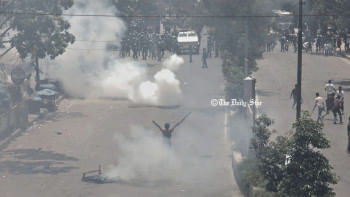Road Transport Act 2018 – details, repercussions, reactions

After much delay and drama, the new Road Transport Act 2018 has finally come into effect at the start of November. After the long-standing Motor Vehicle Ordinance of 1983, the new act introduces a myriad of updated laws and adds new definitions for what constitutes an offence, with most of the fines and punishments receiving major bumps. Here is a brief analysis and overview of some of the more noticeable changes.
Background
Management of traffic and enforcement of traffic laws in Bangladesh has been always been something of a basket case. The road development in our country never really managed to keep up with the rapid increase of vehicles. However, things got worse recently, as the lax laws and high demand for drivers meant that many new drivers did not even apply for driver training and learned how drive "on the job".
According to Bangladesh Road Transport Authority (BRTA) statistics as of February 2017, Bangladesh had over 2.9 million registered vehicles, but only 1.9 million of them had driver's licenses. These one million "ghost" drivers, lacking any knowledge about traffic rules or safe driving, have taken a bloody toll on the roads. According to Bangladesh Jatri Kalyan Samity—a passenger welfare forum— at least 224 people have been killed and 866 injured in 203 road accidents on the first 12 days of August 2019 alone.
A reformed traffic law was a long time coming, but it was constantly pushed back due to strong opposition from transport workers. A catalyst was required to rally the public for reform, which came in 2018—sadly at the cost of two lives. On 29 July 2018, two students of Shaheed Romijuddin Cantonment College were killed when a speeding bus ploughed into a bus stop on Airport Road. The subsequent lack of action from authorities and the callous attitudes of the transport and shipping ministers at the time started a nation-wide student protest that demanded better traffic laws and road safety. And while the protest was eventually violently put down, it did pave the way for the new Road Transport Act 2018. The act was approved by the President on October 8 of 2018 along with the Digital Security Act 2018—however, while the Digital Security Act came into force with immediate effect, the Road Transport Act was held back by over a year by rioting transport workers, who had much to lose once the law went into effect. Despite this, the act has now finally gone though and has been enforced from the start of November.
What's new?
Of all the new things in this act, two stand out the most.
Firstly, all licenses now carry 12 points. Nine types of traffic violations—such as speeding or excessive honking—will result in a point being awarded to a license. If a license reaches 12 points, it will be revoked. When a senior ranking Bangladesh Road Transport Authority (BRTA) official was asked for a comment, he sought anonymity and said this measure is impossible to enforce right now as most drivers do not have a digital driving license. Proper implementation will take a long time as well, as the BRTA is currently having trouble issuing new driving licenses due to card shortages.
Secondly, the introduction of an academic requirement dictates the applicant has to at least pass class eight before applying for a driving license. This, although a definite improvement still means someone who does not hold even a Secondary School Certificate, can drive a vehicle. As surprising as it may seem, no academic qualification was required to apply for a license previously.
Bloated fines
Another change that immediately caught everyone's attention were the updated fines. The fines now have quite a few more zeros behind them.
For example, driving without a license used to result in a mere TK 500 fine. With the new act, it is now up to TK 25,000. Driving with a fake license? Also used to be tk 500 but now it is TK 1 to 5 lakhs. Driving without a fitness certificate will now carry a fine of TK 25,000, while jaywalking, driving without a seatbelt and parking illegally—previously an offence of TK 200—all carry fines of TK 5,000. Driving on the wrong side, speeding, breaking traffic signals and riding a motorbike without a helmet can get you fined up to TK 10,000.
These updates—while understandable and expected—has the side effect of turning what was before a minor inconvenience for most into something that has the potential to economically cripple a middle-income family for a few months. Car owners have to be much more careful with their car and more importantly, their hired driver, whose driving license may or may not be real.
Another change that will surely hurt all car users is the update to the "alteration to motor vehicles" section. The previous Section 42 was left vague and only had a TK 5,000 fine. In the new act, Section 40 replaces Section 42 and brings in 18 different classifications, in which modifications to a car is punishable by a fine of up to TK 3 lakh. These classifications include both front and rear overhangs (the basic dimensions of the car)—meaning technically, the all too common steel bumper additions found in most of the cars is a crime under this law. Along with that, aftermarket exhausts, bigger wheels, modified horns, indicators, brakes and more, all fall under the "illegal modification" classification.
Accidents and death penalty
Thirty-three years ago, the maximum punishment for causing death by reckless and negligent driving was a jail term of seven years. But in the face of truckers' protests in 1985, the Ershad government reduced the term of imprisonment to three years by amending the Penal Code.
In the new act, Section 105 of 11th chapter states no matter what, if anybody gets seriously injured or killed in a motor vehicle-related accident, it would be considered as an offence under the relevant sections of the Penal Code, 1860. This ranges from Section 302 to 304B, with the maximum punishment being a death sentence. The offences that fall under section 105 of the act are not eligible for bail.
Mixed reception
The reception to these changes has been controversial, to say the least. A director at BRTA, who wished to stay anonymous, thinks the increase in fine has been too steep and will do more harm than good in the long run.
This view is shared by many car owners who, while agreeing with the overall act, think this price hike is an overreaction.
"(This law is) an exaggerated reaction. Will this actually have any impact on serious offenders such as public transport accidents?" asked Zaeem Aziz, a classic car collector and importer currently based abroad.
Others think these act is a step in the wrong direction as higher fines will not remove uneducated and/or untrained drivers from the road. "Dhaka is the capital of one of the fastest growing economies of the world and our traffic signals are not followed—I believe there should have been campaigns where drivers are taught and educated of common road and traffic rules. There is also an embarrassing amount of corruption within the authorities. In order to get a license an individual is expected to pay a bribe. If someone passes a test with a bribe how can we expect them to be good at it?" asks Sam Dcosta, an entrepreneur and an active member of the Vespa Club of Bangladesh.
Some car owners also think it is now the time to remove the yearly AIT charges for cars or use a flat rate so everyone can update their papers without issue.
Doubts about enforcement
Despite being put on effect, there are considerable doubts among people in various circles about successful enforcement of these new laws. Some thinks the laws will be enforced selectively, while others think bribe rates will skyrocket.
Moreover, it seems the authorities were completely unprepared to enforce the new act. According to a report published by the Daily Star, law enforcers could not impose any of the new on-the-spot fines as their point of sale machines have not been updated. Furthermore, mobile courts run by BRTA apparently could not enforce the new laws as they were not incorporated in the schedule of the Mobile Court Act, 2009.
When reached out for comment, the officer-in-change of Tejgaon police station said they are ill prepared to do so, as they have to yet receive the official gazette. Daily Star also has reached out to several other police officers, but they too declined to comment.

 For all latest news, follow The Daily Star's Google News channel.
For all latest news, follow The Daily Star's Google News channel. 



Comments